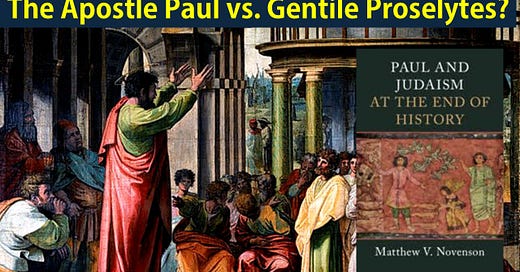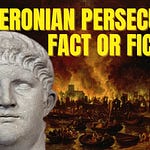Matthew V. Novenson
Paul and Judaism at the End of History
Oxford: Oxford University Press, 2024.
Okay, we are back into Novenson’s book on Paul and Judaism at the End of History, and this time we are into Novenson’s intriguing proposal in his essay “Paul versus the Gentiles.”
We are accustomed to thinking of Paul’s opponents as either local Jews or a posse of Jewish Christians who followed him around and caused havoc for him. But, what if Paul’s opponents were gentiles, gentile proselytes, gentile converts to Judaism who had been circumcised?
Oy Vey, Always with the Jewish Christians!
You have to remember that since the 1830s, a common line in scholarship has been that there was a Jewish Christian bloc who were vehement anti-Paulinists, who followed Paul wherever he went, and chastised his gentile converts telling them that they had to be circumcised.
Novenson points out that those persons advocating for proselyte circumcision for gentile Christ-believers are often supposed to be either local Jews or else Christ-believing Jews connected to the Jerusalem church.
But Novenson contends: “I argue that the proponents of proselyte circumcision whom Paul opposes in Galatians and Philippians and imagines in Romans are themselves recently circumcised gentile proselytes” (78). While Paul might have caught beef with some Jewish Christ-believers (2 Corinthians 10-13) the presenting issue there was not over circumcision. And for the most part, when Paul talks about Jewish Christian leaders like Cephas and James, he ordinarily stresses their agreement with him that gentiles did not have to be circumcised (Gal 2:7-9).
Novenson is right that often we do not know who Paul’s opponents precisely were, as even Paul speaks of them in oblique terms like “those agitators” (Gal 5:12) or merely with derogatory descriptions like “dog” (Phil 3:3). The ethnicity of the opponents and whether they are Christ-believers is not always clear.
I certainly think that it is possible the agitators in Galatia were Christ-believing proselytes who urged the Galatian gentile Christ-believers to be circumcised like them. Their argument probably ran: Be circumcised like Abraham in order to be children of Abraham (Gal 3:6-29), circumcision will lead to your completion in the faith (Gal 3:3), plus they allege that Paul himself normally preached circumcision but has left it out because he’s a people-pleaser (Gal 1:10; 6:11). What gives that an air of plausibility is Novenson following Johannes Munck in noticing that the proponents of proselyte circumcision for the Galatians are called περιτεμνόμενοι (“those being circumcised”) in Gal 6:13 which is an odd way to refer to Jews who are more often signified by the noun περιτομῆς (“[the] circumcision”) not the “ones having been circumcised.” Paul is perhaps referring to recently circumcised gentiles who are troubling the Galatians.
Novenson writes: “In Galatians, in other words, all of the Jewish apostles, not just Paul, oppose proselyte circumcision for gentiles-in-Christ. The only people who foolishly agitate for proselyte circumcision are other proselyte-circumcised judaizers, οἱ περιτεμνόμενοι, ‘Those who get themselves circumcised’” (90).
Yes, Maybe, But What About …
I do think this is plausible, but I do need to push back on a few aspects here.
First, there were certain “false believers” at the Jerusalem council who did apparently advocate circumcising gentiles but to no effect because the pillar apostles sided with Paul and Barnabas with the result that Titus was not compelled to be circumcised (Gal 2:3-9; Acts 15:5 calls them Pharisees). Yet the episode does indicate that proselyte circumcision was advocated by certain Jewish Christ-believers at the Jerusalem council albeit unsuccessfully. In addition, it was perhaps the unresolved ambiguities surrounding the Jerusalem council that resulted in further problems because the council’s decision assumed that the Jewish and Gentile missions were largely separate events. What happens when Jewish and Gentile Christ-believers worship, eat, and live together?
At the incident at Antioch (Gal 2:11-14), Cephas and Barnabas engage in shared meals with gentiles (kosher meals I believe!), but when “certain men from James arrived” Cephas withdrew from the mixed fellowship from “fear of the circumcision.” Cephas was joined by “other Jews” and Paul opines that even Barnabas was led astray. Paul chastises Cephas for this hypocrisy as he formerly had no problem eating with gentiles, and Paul then proceeds to rebuke Cephas for compelling gentiles to judaize.
Now, I think the “men from James,” whatever their motivation, whether they exceeded their remit or not, were Jewish Christ-believers. The “other Jews” who joined Cephas and Barnabas in separting from shared meals were Jewish Christ-believers too. But the “circumcision” of whom Cephas was purportedly afraid of could refer to the “men from James” or perhaps to local Jews and proselytes in Antioch who harbored suspicion or hostility toward the ethnically-mixed messianic chapter in their vicinity.
Unlike Novenson, I do think circumcision was an underlying factor in the incident in Antioch. The men from James were implying that the Christ-believing Jews had to withdraw from mixed meal fellowship unless the Christ-believing gentiles consented to be circumcised. Thus, the choice was separation from gentiles or the circumcision of gentiles. Nobody was explicitly demanding that the Christ-believing gentiles be circumcised, but Cephas and his entourage were pressured to refrain from eating with gentiles unless they were! This was arguably the unforeseen circumstances emerging from the Jerusalem council and Paul treated it as a violation of the spirit of the agreement.
Accordingly, the issue of coercing gentiles to judaize and be circumcised is what links together the Jerusalem council (Gal 2:3), the incident at Antioch (Gal 2:14), and the situation in Galatia (Gal 6:12) – here I’m in agreement with Mark Nanos, PwJ scholar extraordinaire. The circumcision of gentiles was an issue among Jewish Christ-believing groups in Jerusalem, Antioch, and perhaps even in Galatia.
Second, what is problematic for Novenson’s thesis that gentile proselytes were the agitators in Galatia is two things emerging in Gal 6:12-13: boasting and persecution.
12 It is those who want to make a good showing in the flesh that try to compel you to be circumcised—only that they may not be persecuted for the cross of Christ. 13 Even the circumcised do not themselves obey the law, but they want you to be circumcised so that they may boast about your flesh.
(1) The proselytizers desire to boast of the flayed flesh of the Galatians (Gal 6:13) has the same note of triumphalistic Judean nationalism as David coming home with a bag of Philistine foreskins (1 Sam 18:25-27) or the Hasmonean forced-conversions of the nearby tribes around Judea (see Josephus). It sounds like something a Jew would boast about rather than a proselyte.
(2) How does proselytizing other Christ-believing gentiles save the agitators, Christ-believing proselytes, from persecution for the sake of the cross (Gal 6:12)? There are two options as to why the agitators wanted the Galatian gentiles to be circumcised.
The first is that maybe the agitators wanted to resolve the Galatians’ ambiguous status as neither pagans nor Jews by circumcising them, effectively making them Jewish, and thus placing them under the aegis and legal protections of Jewish communities, and so avoid any persecution for failing to participate in pagan public rituals. But, if the agitators are themselves proselytes, circumcised converts to Judaism albeit with faith in Christ, then they are already safe and need not fear persecution. If they are proselytes to Judaism, then what do they have to fear from the local Jews or from civic authorities? How do they avoid being persecuted by circumcising the gentile Christ-believers?
The second option, the one I ordinarily prefer, is that the agitators wish to persuade the Galatians to be circumcised in order to take the pressure off the Jerusalem church and its daughter-churches in Judea who have experienced attacks from zealous Judeans who are persecuting Jewish Christ-believers for scandalously fraternizing with uncircumcised gentiles in Antioch and its own daughter churches in Galatia. That position, I submit, requires the agitators to be Jewish Christ-believers.
Looking at Philippians
Moving to Philippians, Novenson says, “In Philippians, the evidence that Paul’s circumcision-preaching opponents are gentile proselytes is even more explicit than in Galatians” (91).
The problem with Paul’s opponents in his letter to the Philippians is that Paul probably refers to hostility from various groups he’s up against in Ephesus which could include a mixture of civic authorities, pagan critics, local Jewish leaders, and rival Jewish Christ-believers and their Gentile converts (see Phil 1:15-18, 28-30; 3:2-4, 18-19, and the introduction to the Philippians commentary by myself and Nijay Gupta). I think it nearly impossible to pin this impassioned rhetoric against a single entity, be they Jewish Christ-believers or even Christ-believing gentiles. Furthermore, I do not think that any proselytizers – Jewish or gentile – have arrived in Philippi, so the warnings in Phil 3:3-4 are about a hypothetical threat, not real opponents in Philippi.
Where Novenson is interesting is his comparison of 2 Cor 11:22-29 with Phil 3:3-4 where in both cases Paul lays out his Jewish credentials. Novenson believes that whereas Paul in 2 Cor 11:22 emphasizes his equality with the super apostles, in Phil 3:3-4 he stresses his superiority to the “bad workers.” Novenson writes, “The super-apostles in Corinth are natural-born Jews like Paul. The bad workers [in Philippi], by contrast, are gentile poseurs” (93).
Novenson might be right about the opponents in Phil 3:3-4, but only because I think we do not have enough details about who the opponents and rivals are mentioned in Philippians. That said, his argument needs to be reversed entirely. In 2 Cor 11:22-29 Paul stresses not his equality to the super-apostles, but his superiority, literally saying, “I am better” as evidenced by his list of trials (2 Cor 11:23). While in Phil 3:3-4, Paul stresses his equal stake in Jewish inherited privileges, the difference is that he considers them loss for the sake of knowing Christ.
Novenson is correct to point to evidence from the second century where we have examples of both Jewish Christ-believing proselytizers (Justin, Dial. 47.4) and gentile Christ-believing judaizers (Ignatius, Phild. 6.1). It shows just how complex the situation was and we cannot assume that proselytizers are always Jewish.
I think Novenson’s contention that Paul’s opponents, who argued for the circumcision of gentile Christ-believers, were themselves circumcised gentile Christ-believers, is feasible, but some of the specific evidence he brings up in Galatians and Philippians have their problems.
Summary
In terms of the argument for Paul’s opponents as proselytes, I’m going to call it a draw.
But, in Novenson’s favour, I can offer an analogy. Imagine a 14 hr Melbourne to Dallas flight, finding yourself seated between a secular Jew and a Seventh Day Adventist, and having to listen to 14 hrs of arguments between them about the validity and goodness of the Old Testament Laws. On the widow side, there is the secular Jew, dismissing biblical food laws and the sabbath as archaic, then on the aisle side, the Adventist Christian is championing those very same laws with relish and zeal. If such things can happen in modern life, maybe they happened in antiquity too.
The next chapter I review of Novenson will be about “Carnal Israel,” which I again, have some disagreements with, and this is perhaps the main faultline between the NPP and PwJ.















Share this post